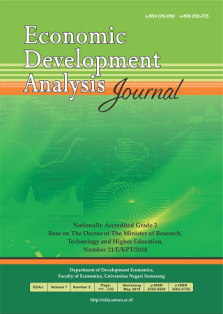The Determination of Leading Sectors to Improve Bandung City’s Competitiveness
Abstract
This study aims to identify the leading sectors in 2010-2019 and future economic development strategies in order to increase the economic competitiveness of Bandung City, Indonesia. The method used is a combined analysis of static and dynamic Location Quotient (LQ), Shift-Share, Growth Ratio Model (MRP), Overlay and Klassen Typology. The results showed that 8 (eight) sectors are classified into advanced and rapidly growing sectors: construction; wholesales, retail, car and motor repair; transportation and warehousing; accommodation and food and beverage; information and communication; financial and insurance services; corporate services; health services; and social activities and others. Economic development strategies to improve the economic competitiveness of Bandung can be done in the short, medium, and long term. In the short term, it is maintaining the advanced and rapidly growing sectors and encouraging others in the advanced category sector but are depressed to be advanced and grow rapidly. In the medium term, local government can strive for potentially growing rapid sectors into advanced and growing rapidly sectors; additionally, it can support relatively lagging sectors to become potential or still develop. Furthermore, in the long-term, other lagging sectors are aimed to become advanced and grow rapidly.


